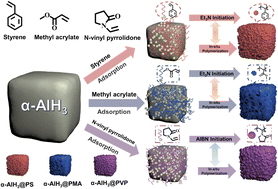In this study, various polymer materials, such as polystyrene (PS), polymethyl acrylate (PMA), and polyvinyl pyrrolidone (PVP), are successfully encapsulated on the surface of alpha-aluminum hydride (α-AlH3) by the in situ polymerization method. The different polymers on the surface of α-AlH3 can lead to a tremendous enhancement of the material in terms of different properties. Due to the good heat resistance of PS, α-AlH3@PS composites take 625.25 min to lose 1% mass, and the activation energy increased by 11.72 kJ mol−1 compared with that before coating, showing good thermal stability. The high degree of cross-linking polymerization of PMA on the surface isolates α-AlH3 from an external environment, enabling it to maintain a high heat of combustion even after extreme humidity and heat treatment respectively. In addition, PVP has a high adsorption capacity for α-AlH3, which can not only improve the thermal and wet stability of α-AlH3 but also increase its electrostatic susceptibility from 24.6 mJ to 163.2 mJ. The in situ polymerization of encapsulated α-AlH3 has promising applications in aerospace and weapon fields, and the resulting α-AlH3@PVP has potential applications in solid propellant formulations.

